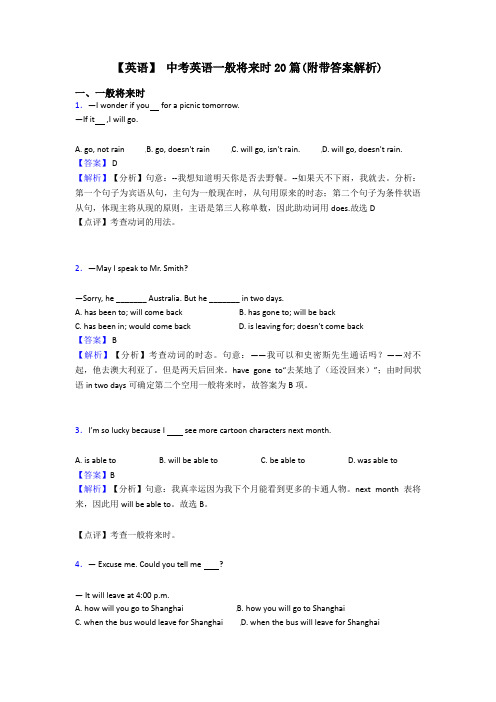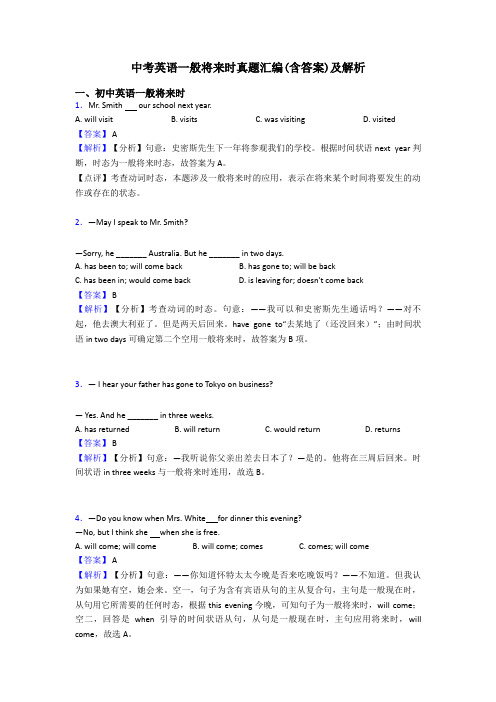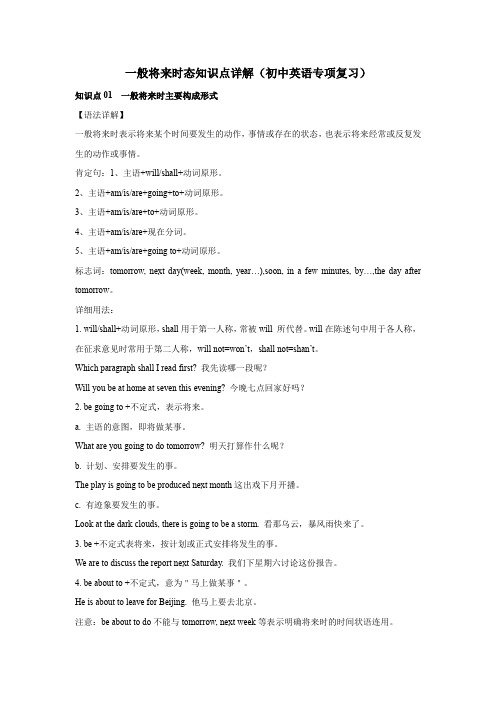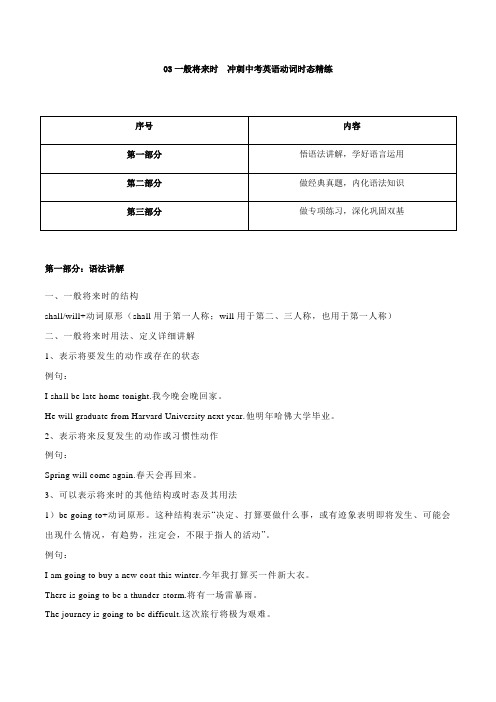一般将来时态 中考详解
【英语】 中考英语一般将来时20篇(附带答案解析)

【英语】中考英语一般将来时20篇(附带答案解析)一、一般将来时1.—I wonder if you for a picnic tomorrow.—If it ,I will go.A. go, not rainB. go, doesn't rainC. will go, isn't rain.D. will go, doesn't rain.【答案】 D【解析】【分析】句意:--我想知道明天你是否去野餐。
--如果天不下雨,我就去。
分析:第一个句子为宾语从句,主句为一般现在时,从句用原来的时态;第二个句子为条件状语从句,体现主将从现的原则,主语是第三人称单数,因此助动词用does.故选D【点评】考查动词的用法。
2.—May I speak to Mr. Smith?—Sorry, he _______ Australia. But he _______ in two days.A. has been to; will come backB. has gone to; will be backC. has been in; would come backD. is leaving for; doesn't come back【答案】 B【解析】【分析】考查动词的时态。
句意:——我可以和史密斯先生通话吗?——对不起,他去澳大利亚了。
但是两天后回来。
have gone to“去某地了(还没回来)”;由时间状语in two days可确定第二个空用一般将来时,故答案为B项。
3.I’m so lucky because I see more cartoon characters next month.A. is able toB. will be able toC. be able toD. was able to【答案】B【解析】【分析】句意:我真幸运因为我下个月能看到更多的卡通人物。
中考英语语法复习课件一般将来时

否定句:主语 + be动词+ not +going to+动原+其它. • Look at the sunshine. There is not going to be rain. 看那阳光
,这将不会下雨。 • They aren't going to have an English test next week.他们下周
Tomorrow. 明天。
一般将来时态的结构: 第2类:be going to + 动原 肯定句:主语 + be动词 + going to + 动原+其它. • He is going to spend his holidays in London. 他打算在伦敦度
假。 • They are going to have an English test next week.他们下周有
英语考试吗?
特殊疑问句:特殊疑问词+ be动词 + 主语 +going to+动原+其 它? • What are you going to do tomorrow?明天你打算作什么? • What are they going to do next week?他们下周将去做什么?
一般将来时态的结构: 第3类:现在进行时表将来 (1)come, go, arrive, leave, start, begin, return等瞬时位移动词 的一般现在时可以表示将来含义,主要用来表示在时间上已确 定或安排好的事情。这类情况主要用于表示按照计划或安排将 要发生的动作或事件,常表示最近或较近的将来,有“意图”、“ 安排”或“打算”,常用肯定句,如come,go, leave等。 • The train leaves at six tomorrow morning. 火车明天上午六点
中考英语一般将来时真题汇编(含答案)及解析

中考英语一般将来时真题汇编(含答案)及解析一、初中英语一般将来时1.Mr. Smith our school next year.A. will visitB. visitsC. was visitingD. visited【答案】 A【解析】【分析】句意:史密斯先生下一年将参观我们的学校。
根据时间状语next year判断,时态为一般将来时态,故答案为A。
【点评】考查动词时态,本题涉及一般将来时的应用,表示在将来某个时间将要发生的动作或存在的状态。
2.—May I speak to Mr. Smith?—Sorry, he _______ Australia. But he _______ in two days.A. has been to; will come backB. has gone to; will be backC. has been in; would come backD. is leaving for; doesn't come back【答案】 B【解析】【分析】考查动词的时态。
句意:——我可以和史密斯先生通话吗?——对不起,他去澳大利亚了。
但是两天后回来。
have gone to“去某地了(还没回来)”;由时间状语in two days可确定第二个空用一般将来时,故答案为B项。
3.— I hear your father has gone to Tokyo on business?— Yes. And he _______ in three weeks.A. has returnedB. will returnC. would returnD. returns【答案】 B【解析】【分析】句意:—我听说你父亲出差去日本了?—是的。
他将在三周后回来。
时间状语in three weeks与一般将来时连用,故选B。
4.—Do you know when Mrs. White for dinner this evening?—No, but I think she when she is free.A. will come; will comeB. will come; comesC. comes; will come【答案】 A【解析】【分析】句意:——你知道怀特太太今晚是否来吃晚饭吗?——不知道。
英语一般将来时中考真题 含答案解析

英语一般将来时中考真题含答案解析一、初中英语一般将来时1.In the near future, there ________ self-driving cars in our city.A. isB. wasC. areD. will be【答案】 D【解析】【分析】句意:在不久的将来,我们城市将会有自动驾驶汽车。
根据In the near future,可知时态是一般将来时,there be结构的一般将来时为:there will be,故选D。
【点评】考查时态,注意there be结构的一般将来时为:there will be的用法。
2.—May I speak to Mr. Smith?—Sorry, he _______ Australia. But he _______ in two days.A. has been to; will come backB. has gone to; will be backC. has been in; would come backD. is leaving for; doesn't come back【答案】 B【解析】【分析】考查动词的时态。
句意:——我可以和史密斯先生通话吗?——对不起,他去澳大利亚了。
但是两天后回来。
have gone to“去某地了(还没回来)”;由时间状语in two days可确定第二个空用一般将来时,故答案为B项。
3.—Tom wants to know if you ________ a picnic next Sunday.—Yes. But if it ________, we'll visit the museum instead.A. will have; will rainB. have; rainsC. have; will rainD. will have; rains【答案】D【解析】【分析】句意:汤姆想知道下周日你们是否去野炊。
一般将来时态知识点详解(初中英语专项复习) (4)

一般将来时态知识点详解(初中英语专项复习)知识点01 一般将来时主要构成形式【语法详解】一般将来时表示将来某个时间要发生的动作,事情或存在的状态,也表示将来经常或反复发生的动作或事情。
肯定句:1、主语+will/shall+动词原形。
2、主语+am/is/are+going+to+动词原形。
3、主语+am/is/are+to+动词原形。
4、主语+am/is/are+现在分词。
5、主语+am/is/are+going to+动词原形。
标志词:tomorrow, next day(week, month, year…),soon, in a few minutes, by…,the day after tomorrow。
详细用法:1. will/shall+动词原形,shall用于第一人称,常被will 所代替。
will在陈述句中用于各人称,在征求意见时常用于第二人称,will not=won’t,shall not=shan’t。
Which paragraph shall I read first? 我先读哪一段呢?Will you be at home at seven this evening? 今晚七点回家好吗?2. be going to +不定式,表示将来。
a. 主语的意图,即将做某事。
What are you going to do tomorrow? 明天打算作什么呢?b. 计划、安排要发生的事。
The play is going to be produced next month这出戏下月开播。
c. 有迹象要发生的事。
Look at the dark clouds, there is going to be a storm. 看那乌云,暴风雨快来了。
3. be +不定式表将来,按计划或正式安排将发生的事。
We are to discuss the report next Saturday. 我们下星期六讨论这份报告。
中考英语动词时态精练解析版--一般将来时

03一般将来时冲刺中考英语动词时态精练第一部分:语法讲解一、一般将来时的结构shall/will+动词原形(shall用于第一人称;will用于第二、三人称,也用于第一人称)二、一般将来时用法、定义详细讲解1、表示将要发生的动作或存在的状态例句:I shall be late home tonight.我今晚会晚回家。
He will graduate from Harvard University next year.他明年哈佛大学毕业。
2、表示将来反复发生的动作或习惯性动作例句:Spring will come again.春天会再回来。
3、可以表示将来时的其他结构或时态及其用法1)be going to+动词原形。
这种结构表示“决定、打算要做什么事,或有迹象表明即将发生、可能会出现什么情况,有趋势,注定会,不限于指人的活动”。
例句:I am going to buy a new coat this winter.今年我打算买一件新大衣。
There is going to be a thunder-storm.将有一场雷暴雨。
The journey is going to be difficult.这次旅行将极为艰难。
2)be going to和will等的比较。
①will表示说话人认为、相信、希望或假定要发生的事,不含任何具体时间,可以指遥远的将来。
而be going to指有迹象表明某事即将发生或肯定会发生,通常表示很快就要发生的事情。
例句:There is going to be a quarrel between them, I think.看来两人要发生争吵了。
He is going to get better.他的病就要好了。
②be going to和will均可表示“意图”;但事先考虑过的意图用be going to,而不是事先考虑的意图用will。
例句:A: Why have you torn the paper into pieces?B: I am going to rewrite it. (事先考虑的)A: It is a really big stone.B: I will help you to move it. (未经考虑的)3)现在进行时。
一般将来时详解+例句

一般将来时详解+例句一、单项选择一般将来时1.Why don’t you put the meat in the fridge? It will_______fresh for several days.A.be stayed B.stay C.be staying D.have stayed【答案】B【解析】【详解】考查将来时态。
句意:你为什么不把肉放进冰箱呢?会保持新鲜好几天呢。
stay意为“保持”时是不及物动词,不能用于被动语态,故排除A项;stay作“保持”讲时,是表示状态的动词,没有进行时态,故排除C项;will have stayed是强调肉放入冰箱之后的结果,可肉还没有放入冰箱,故排除D项。
故选B。
2.AC Milan has confirmed that the England star David Beckham ______the team soon. A.has rejoined B.was going to rejoinC.rejoined D.is to rejoin【答案】D【解析】试题分析:考查时态。
本句考查的是将来时的一种表达法be to do sth将要做某事;句意:AC米兰俱乐部确认英国球星贝克汉姆将很快就重新加盟该队。
本句的关键词是soon该词经常与将来时连用。
故D正确。
考点:考查将来时的表达法点评:在英语中将来时有多种表达法。
Be to do sth表示计划的事情;或者表示注定要做某事;也可以表示命令做某事,相当于have to, must,should; will表示一般的将来,或者临时决定做某事;be going to do sth表示按照计划安排要做某事;或者根据某种迹象要做某事;be about to do sth即将做某事,不与表示将来时的时间状语连用。
现在进行时表示一般将来时,表示按照计划安排要发生的事情,且动词要是一些表示位置变化的动词。
3.A good film producer must make sure that his films ____ fit into the needs of the changing market.A.are to B.will C.are going to D.are about to【答案】A【解析】试题分析:考查将来时的表达法。
一般将来时态讲解及练习

一般将来时态讲解及练习一、将来时间1、next+ 时间例如:next Monday / week/ hour / year……2 、this+ 时间(是实际情况而定,表示这……或者今……)例如:this weekend 这周末 this evening 今天晚上3、tomorrow 明天4 、in + 段时间例如:in five minutes / three hours / two months……4、不明确的时间:after class / school / doing homework……翻译下列时间:下周五___________________________明年___________________________5个工作日内______________________今天早上______________________吃完饭后__________________________后天__________________________明天早上__________________________二、be going to+动词原形表将来:预料在最近发生的事,计划或安排要做的事。
肯定句: My father is going to go to Shanghai next week.否定句: My father isn’t going to go to Shanghai next week.一般疑问句:Is your father going to go to Shanghai next week?Yes, he is. No, he isn’t.特殊疑问句: When is your father going to go to Shanghai?-----Next week.三、把下列各句译成英语。
1、我叔叔今晚要来。
My uncle ___________ _____________ ________________.2、他没有打算住在那座小屋。
- 1、下载文档前请自行甄别文档内容的完整性,平台不提供额外的编辑、内容补充、找答案等附加服务。
- 2、"仅部分预览"的文档,不可在线预览部分如存在完整性等问题,可反馈申请退款(可完整预览的文档不适用该条件!)。
- 3、如文档侵犯您的权益,请联系客服反馈,我们会尽快为您处理(人工客服工作时间:9:00-18:30)。
一般将来时态崔海英一定义:一般将来时态用来表示将要发生的动作或即将要做的事情,通常用"be going to +动词原形"或"will / shall +动词原形"来构成。
但在实际的阅读和写作中,还可以用其它方式表示将来时。
二一般将来时谓语动词形式可以分为五种:1"助动词shall / will +动词原形"表示将来某个时间要发生的动作或存在的状态。
其中shall通常用于第一人称,will 可用于各种人称,其否定形式缩写分别为shan't 和won't。
例如:He will come to see you the day after tomorrow. 他后天会来看你。
We shall / will go out for a drive if it's sunny. 如果天气好的话,我们将开车出去兜风。
2"be (is, am, are) going to +动词原形"表示即将发生的或打算最近要做的事情,主要用于口语。
例如:There is going to be a Japanese film this afternoon. 今天下午有一场日本电影。
We are going to have a swim this evening. 今天晚上我们要去游泳。
3、表示位移的动词go, come, leave, start, move, begin 等可用进行时态表示按计划即将发生的动作。
例如:He says he is leaving for Beijing tomorrow morning. 他说他明天早上将去北京。
Please wait for a moment. I'm coming soon. 请等一会儿,我马上就来。
4"be to +动词原形"表示按计划将要发生的事情或征求意见。
例如:Are we to go on with this work? 我们继续干这项工作吗?The boy is to go to school next Monday. 这个男孩下周一去上学。
5"be about to +动词原形"表示即将发生的动作,它不能与表示将来的时间状语连用。
例如:He is about to move to Canada. 他将搬到加拿大去。
They are about to learn some new words. 他们将学一些新单词。
三一般将来时常用的时间状语这一时态常用的时间状语有:tomorrow, next time, in a month, from now on, later (on) , soon等。
例如:It's going to snow later (on). 过会儿要下雪。
Tom will come back in two days. 汤姆两天后回来。
I'll be more careful from now on. 从现在起我会更加小心的。
四一般将来时的各种句式一般疑问句:将句中的助动词shall/will 提前,或是在有be动词的情况下将be 动词提前。
例如:Will you say more slowly,please? 请再说得慢一些好吗?Are you going to play computer games tomorrow afternoon? 你打算明天下午玩电子游戏吗?否定句,在will/shall,或是be动词之后加not,例如:I won't be careless from now on. 从现在起我不会再粗心大意了。
There isn't going to be a film this afternoon. 今天下午没有电影。
习题部分:一,单项选择( ) 1. There __________ a meeting tomorrow afternoon.A. will be going toB. will going to beC. is going to beD. will go to be( ) 2. Charlie ________ here next month.A. isn’t workingB. doesn’t workingC. isn’t going to workingD. won’t work( ) 3. He ________ very busy this week, he ________ free next week.A. will be; isB. is; isC. will be; will beD. is; will be( ) 4. There ________ a dolphin show in the zoo tomorrow evening.A. wasB. is going to haveC. will haveD. is going to be( ) 5. –________ you ________ free tomorrow?– No. I ________ free the day after tomorrow.A. Are; going to; willB. Are; going to be; willC. Are; going to; will beD. Are; going to be; will be( ) 6. Mother ________ me a nice present on my next birthday.A. will givesB. will giveC. givesD. give( ) 7. – Shall I buy a cup of tea for you?–________. (不,不要。
)A. No, you won’t.B. No, you aren’t.C. No, please don’t.D. No, please.( ) 8. – Where is the morning paper?– I ________ if for you at once.A. getB. am gettingC. to getD. will get( ) 9. ________ a concert next Saturday?A. There will beB. Will there beC. There can beD. There are( ) 10. If they come, we ________ a meeting.A. haveB. will haveC. hadD. would have( ) 11. He ________ her a beautiful hat on her next birthday.A. givesB. gaveC. will givingD. is going to giving( ) 12. He ________ to us as soon as he gets there.A. writesB. has writtenC. will writeD. wrote( ) 13. He ________ in three days.A. coming backB. came backC. will come backD. is going to coming back( ) 14. If it ________ tomorrow, we’ll go roller-skating.A. isn’t rainB. won’t rainC. doesn’t rainD. doesn’t fine( ) 15. – Will his parents go to see the Terra Cotta Warriors tomorrow?– No, ________ (不去).A. they willn’t.B. they won’t.C. they aren’t.D. they don’t.( ) 16. Who ________ we ________ swimming with tomorrow afternoon?A. will; goB. do; goC. will; goingD. shall; go( ) 17. We ________ the work this way next time.A. doB. will doC. going to doD. will doing( ) 18. Tomorrow he ________ a kite in the open air first, and then ________ boating in the park.A. will fly; will goB. will fly; goesC. is going to fly; will goesD. flies; will go( ) 19. The day after tomorrow they ________ a volleyball match.A. will watchingB. watchesC. is watchingD. are going to watch( ) 20. There ________ a birthday party this Sunday.A. shall beB. will beC. shall going to beD. will going to be( ) 21. They ________ an English evening next Sunday.A. are havingB. are going to haveC. will havingD. is going to have( ) 22. ________ you ________ free next Sunday?A. Will; areB. Will; beC. Do; beD. Are; be( ) 23. He ________ there at ten tomorrow morning.A. willB. isC. will beD. be( ) 24. ________ your brother ________ a magazine from the library?A. Are; going to borrowB. Is; going to borrowC. Will; borrowsD. Are; going to borrows( ) 25. – Shall I come again tomorrow afternoon?–________ (好的).A. Yes, pleaseB. Yes, you will.C. No, please.D. No, you won’t.( ) 26. It ________ the year of the horse next year.A. is going to beB. is going toC. will beD. will is( ) 27. ________ open the window?A. Will you pleaseB. Please will youC. You pleaseD. Do you( ) 28. –Let’s go out to play football, shall we?– OK. I ________.A. will comingB. be going to comeC. comeD. am coming( ) 29. It ________ us a long time to learn English well.A. takesB. will takeC. spendsD. will spend( ) 30. The train ________ at 11.A. going to arriveB. will be arriveC. is going toD. is arriving()31.Mother ________ me a nice present on my next birthday.A. will givesB. will giveC. givesD. give( )32.He ________ her a beautiful hat on her next birthday.A. givesB. gaveC. will giveD. is going giving( )33. He ________ in three days.A. coming backB. came backC. will come backD. is going tocoming back()34. Who ________ ________ swimming with us tomorrow afternoon?A. will; goB. do; goC. will; goingD. shall; goes()35. The day after tomorrow they ________ a volleyball match.A. will watchB. watchesC. is watchingD. to watch()36. They ________ an English evening next Sunday.A. are havingB. are going to haveC. will havingD. is going tohave()37. ________ you ________ free next Sunday?A. Will; areB. Will; beC. Do; beD. Are; be()38. He ________ there at ten tomorrow morning.A. willB. isC. will beD. be()39. I ____ _____ a teacher in the future.A. will, beB. is, beC. is, beingD. will, is()40.They ____ _____ to the park next Sunday.A. will goesB. will goC. is goingD. will go二.根据句意,用括号中动词的适当形式填空。
